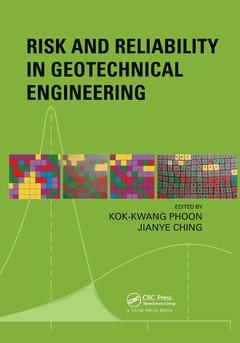Description
Risk and Reliability in Geotechnical Engineering
Coordinators: Phoon Kok-Kwang, Ching Jianye
Language: English
Publication date: 07-2017
· 17.8x25.4 cm · Paperback
Publication date: 12-2014
624 p. · 17.8x25.4 cm · Hardback
Description
/li>Contents
/li>Readership
/li>Biography
/li>
Establishes Geotechnical Reliability as Fundamentally Distinct from Structural Reliability
Reliability-based design is relatively well established in structural design. Its use is less mature in geotechnical design, but there is a steady progression towards reliability-based design as seen in the inclusion of a new Annex D on "Reliability of Geotechnical Structures" in the third edition of ISO 2394. Reliability-based design can be viewed as a simplified form of risk-based design where different consequences of failure are implicitly covered by the adoption of different target reliability indices. Explicit risk management methodologies are required for large geotechnical systems where soil and loading conditions are too varied to be conveniently slotted into a few reliability classes (typically three) and an associated simple discrete tier of target reliability indices.
Provides Realistic Practical Guidance Risk and Reliability in Geotechnical Engineering
With contributions from a broad international group of authors, this text:
- Presents probabilistic models suited for soil parameters
- Provides easy-to-use Excel-based methods for reliability analysis
- Connects reliability analysis to design codes (including LRFD and Eurocode 7)
- Maximizes value of information using Bayesian updating
- Contains efficient reliability analysis methods
Accessible To a Wide Audience
Risk and Reliability in Geotechnical Engineering presents all the "need-to-know" information for a non-specialist to calculate and interpret the reliability index and risk of geotechnical structures in a realistic and robust way. It suits engineers, researchers, and students who are interested in the practical outcomes of reliability and risk analyses without going into the intricacies of the underlying mathematical theories.
Part I. Properties. Constructing multivariate distributions for soil parameters. Modeling and simulation of bivariate distribution of shear strength parameters using copulas. Part II. Methods. Evaluating reliability in geotechnical engineering. Maximum likelihood principle and its application in soil liquefaction assessment. Bayesian analysis for learning and updating geotechnical parameters and models with measurements. Polynomial chaos expansions and stochastic finite-element methods. Practical reliability analysis and design by Monte Carlo Simulation in spreadsheet. Part III. Design. LRFD calibration of simple limit state functions in geotechnical soil-structure design. Reliability-based design: Practical procedures, geotechnical examples, and insights. Managing risk and achieving reliable geotechnical designs using Eurocode 7. Part IV. Risk and decision. Practical risk assessment for embankments, dams, and slopes. Evolution of geotechnical risk analysis in North American practice. Assessing the value of information to design site investigation and construction quality assurance programs. Verification of geotechnical reliability using load tests and integrity tests. Part V. Spatial variability. Application of the subset simulation approach to spatially varying soils. Appendices. List of symbols. References. Index.
Kok-Kwang Phoon is a distinguished professor and head of the Department of Civil and Environmental Engineering, National University of Singapore, and past president of the Geotechnical Society of Singapore. His main research interests include statistical characterization of geotechnical parameters and reliability-based design in geotechnical engineering. He is the recipient of numerous research awards, including the ASCE Norman Medal in 2005 and the NUS Outstanding Researcher Award in 2010. He is the founding editor of Georisk and chair of TC304 (Engineering Practice of Risk Assessment and Management) in the International Society for Soil Mechanics and Geotechnical Engineering.
Jianye Ching
is a professor in the Department of Civil Engineering, National Taiwan University. His main research interests include geotechnical reliability analysis and reliability-based design, basic uncertainties in soil properties, random fields and spatial variability, and geotechnical design codes. He is the secretary of TC304 (risk) in the International Society for Soil Mechanics and Geotechnical Engineering. He is the recipient of the Outstanding Research Award and the Wu-Da-Yu Memorial Award from the National Science Council of Taiwan, Republic of China.



